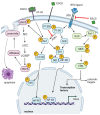The Potential of Epigallocatechin Gallate (EGCG) in Targeting Autophagy for Cancer Treatment: A Narrative Review
- PMID: 35682754
- PMCID: PMC9181147
- DOI: 10.3390/ijms23116075
The Potential of Epigallocatechin Gallate (EGCG) in Targeting Autophagy for Cancer Treatment: A Narrative Review
Abstract
Autophagy is an evolutionarily conserved process for the degradation of redundant or damaged cellular material by means of a lysosome-dependent mechanism, contributing to cell homeostasis and survival. Autophagy plays a multifaceted and context-dependent role in cancer initiation, maintenance, and progression; it has a tumor suppressive role in the absence of disease and is upregulated in cancer cells to meet their elevated metabolic demands. Autophagy represents a promising but challenging target in cancer treatment. Green tea is a widely used beverage with healthy effects on several diseases, including cancer. The bioactive compounds of green tea are mainly catechins, and epigallocatechin-gallate (EGCG) is the most abundant and biologically active among them. In this review, evidence of autophagy modulation and anti-cancer effects induced by EGCG treatment in experimental cancer models is presented. Reviewed articles reveal that EGCG promotes cytotoxic autophagy often through the inactivation of PI3K/Akt/mTOR pathway, resulting in apoptosis induction. EGCG pro-oxidant activity has been postulated to be responsible for its anti-cancer effects. In combination therapy with a chemotherapy drug, EGCG inhibits cell growth and the drug-induced pro-survival autophagy. The selected studies rightly claim EGCG as a valuable agent in cancer chemoprevention.
Keywords: autophagy; autophagy activator; autophagy modulator; cancer therapy; epigallocatechin gallate.
Conflict of interest statement
The authors declare no conflict of interest.
Figures




Similar articles
-
Epigallocatechin-3-Gallate Therapeutic Potential in Cancer: Mechanism of Action and Clinical Implications.Molecules. 2023 Jul 6;28(13):5246. doi: 10.3390/molecules28135246. Molecules. 2023. PMID: 37446908 Free PMC article. Review.
-
Epigallocatechin-3-gallate induces autophagy-related apoptosis associated with LC3B II and Beclin expression of bladder cancer cells.J Food Biochem. 2021 Jun;45(6):e13758. doi: 10.1111/jfbc.13758. Epub 2021 May 16. J Food Biochem. 2021. PMID: 33997996
-
Epigallocatechin-3-Gallate (EGCG) Promotes Autophagy-Dependent Survival via Influencing the Balance of mTOR-AMPK Pathways upon Endoplasmic Reticulum Stress.Oxid Med Cell Longev. 2018 Jan 31;2018:6721530. doi: 10.1155/2018/6721530. eCollection 2018. Oxid Med Cell Longev. 2018. PMID: 29636854 Free PMC article.
-
Molecular Targets of Epigallocatechin-Gallate (EGCG): A Special Focus on Signal Transduction and Cancer.Nutrients. 2018 Dec 6;10(12):1936. doi: 10.3390/nu10121936. Nutrients. 2018. PMID: 30563268 Free PMC article. Review.
-
New insights into the mechanisms of polyphenols beyond antioxidant properties; lessons from the green tea polyphenol, epigallocatechin 3-gallate.Redox Biol. 2014 Jan 10;2:187-95. doi: 10.1016/j.redox.2013.12.022. eCollection 2014. Redox Biol. 2014. PMID: 24494192 Free PMC article. Review.
Cited by
-
Bioinformatics Analysis and Experimental Validation of Epigallocatechin-3-gallate Against Iopromide-induced Injury in HEK-293 Cells via Anti-oxidative and Anti-inflammation Pathways.In Vivo. 2024 Nov-Dec;38(6):2617-2628. doi: 10.21873/invivo.13738. In Vivo. 2024. PMID: 39477405 Free PMC article.
-
Anticancer Mechanism of Flavonoids on High-Grade Adult-Type Diffuse Gliomas.Nutrients. 2023 Feb 4;15(4):797. doi: 10.3390/nu15040797. Nutrients. 2023. PMID: 36839156 Free PMC article. Review.
-
Targeting aging pathways with natural compounds: a review of curcumin, epigallocatechin gallate, thymoquinone, and resveratrol.Immun Ageing. 2025 Jul 3;22(1):28. doi: 10.1186/s12979-025-00522-y. Immun Ageing. 2025. PMID: 40611111 Free PMC article. Review.
-
Epigallocatechin-3-Gallate Therapeutic Potential in Cancer: Mechanism of Action and Clinical Implications.Molecules. 2023 Jul 6;28(13):5246. doi: 10.3390/molecules28135246. Molecules. 2023. PMID: 37446908 Free PMC article. Review.
-
Epigallocatechin-3-gallate therapeutic potential in human diseases: molecular mechanisms and clinical studies.Mol Biomed. 2024 Dec 27;5(1):73. doi: 10.1186/s43556-024-00240-9. Mol Biomed. 2024. PMID: 39725830 Free PMC article. Review.
References
Publication types
MeSH terms
Substances
LinkOut - more resources
Full Text Sources
Medical
Miscellaneous

